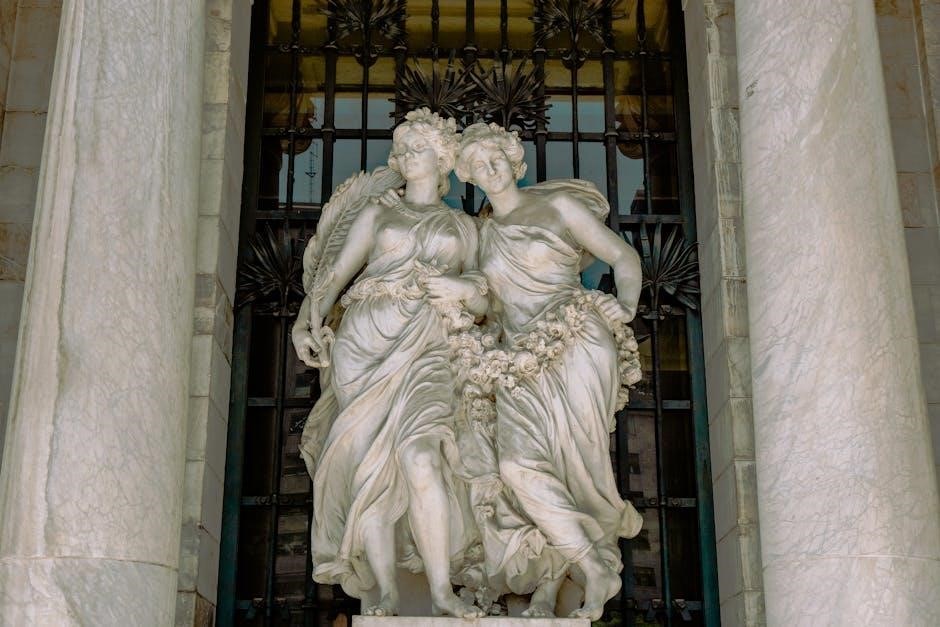Historical Context of “Angels in America: Perestroika”
Set in the 1980s, the play explores the AIDS crisis and Reagan-era conservatism, reflecting societal upheaval. The title “Perestroika” mirrors Gorbachev’s reforms, symbolizing change and national transformation.
1.1 The AIDS Crisis in the 1980s
The AIDS crisis in the 1980s was a devastating period marked by fear, discrimination, and marginalization. The disease, first identified in the early 1980s, disproportionately affected the LGBTQ+ community, with limited medical understanding and treatment options. Many individuals, like Prior Walter in Perestroika, faced diagnosis as a death sentence. The Reagan administration’s slow response exacerbated the crisis, leaving communities to fend for themselves. This era of stigma and neglect shaped the play’s exploration of identity, mortality, and resilience, mirroring the real-life struggles of those affected by the epidemic.
1.2 The Reagan Administration and Conservative Politics
The Reagan administration’s conservative policies and social agenda exacerbated the struggles depicted in Perestroika. The 1980s saw a rise in conservative ideologies, with Reagan’s government often criticized for its slow response to the AIDS crisis. The administration’s emphasis on traditional values and limited support for LGBTQ+ rights created a hostile environment. This political backdrop is reflected in the play’s portrayal of characters like Roy Cohn, who embodies the hypocrisy and power dynamics of the time. The intersection of politics and personal struggle underscores the play’s critique of societal neglect and the resilience of marginalized communities during this era.
1.3 The Title “Perestroika” and Its Significance
The title Perestroika references Mikhail Gorbachev’s Soviet reforms, symbolizing transformation and systemic change. In the play, it mirrors the characters’ journeys and societal shifts during the AIDS crisis. The term reflects themes of rebuilding and political upheaval, paralleling the personal and national struggles depicted in the narrative. This duality underscores Kushner’s exploration of individual and collective transformation, highlighting the need for change in both personal lives and broader political landscapes. The title’s historical context adds depth, linking the play’s themes to global movements for reform and renewal.

Play Structure and Themes
The play is structured in two parts, blending political and social themes with personal journeys. Its non-linear narrative explores identity, morality, and the supernatural, reflecting societal tensions.
2.1 Comparison with “Millennium Approaches”
Whereas Millennium Approaches sets up the narrative, introducing characters and conflicts, Perestroika resolves and deepens these storylines. The first part establishes the chaos of the AIDS crisis and political conservatism, while the second part explores redemption, healing, and personal growth. Themes of identity and spirituality are more pronounced in Perestroika, with the Angel’s presence symbolizing divine intervention and transformation. Structurally, Perestroika is more introspective, focusing on the characters’ journeys toward acceptance and hope, contrasting with the despair of Millennium Approaches. This shift underscores Kushner’s vision of resilience and change amidst societal turmoil.
2.2 The Role of the Angel in Perestroika
The Angel in Perestroika serves as a divine catalyst, appearing to Prior Walter and symbolizing both disruption and transformation. Unlike her introduction in Millennium Approaches, the Angel’s role in Perestroika is more introspective, urging Prior to embrace his prophetic mission. Her presence embodies the clash between celestial authority and human frailty, challenging Prior to find meaning in his suffering. The Angel’s interactions with Prior drive the play’s exploration of spirituality, identity, and redemption, while her symbolic significance extends to broader themes of societal change and the search for hope amidst crisis. Her role underscores Kushner’s exploration of the divine in a fragmented world.
2.3 Political and Social Themes in the Play
Perestroika delves into the intersection of politics and identity, critiquing Reagan-era conservatism and its impact on marginalized communities. The play explores themes of power, morality, and justice, particularly through the lens of the AIDS crisis. It examines the clash between religious ideology and personal freedom, as well as the societal neglect of LGBTQ+ individuals during the epidemic. The characters’ struggles reflect broader issues of systemic oppression and the fight for visibility. Kushner’s work underscores the resilience of those marginalized by political and social structures, offering a powerful commentary on the need for change and the enduring struggle for equality and human rights.

Key Characters in “Perestroika”
Prior Walter, a man with AIDS, leads the story alongside Joe Pitt, Harper Pitt, Louis Ironson, Belize, and Roy Cohn, each navigating identity, loss, and redemption.
3.1 Prior Walter’s Journey
Prior Walter, a central character, embodies resilience as he navigates life with AIDS in 1980s America. His journey begins with a dramatic visit from an angel, symbolizing divine intervention and personal reckoning. Throughout Perestroika, Prior confronts his mortality, grappling with illness and abandonment. He experiences visionary encounters, including a trip to heaven, which challenge his beliefs and identity. Despite his physical decline, Prior discovers inner strength, advocating for himself and others affected by the AIDS crisis. His story intertwines themes of spirituality, activism, and the search for meaning, making him a powerful symbol of hope and defiance in the face of adversity.
3.2 Joe Pitt’s Struggles and Transformation
Joe Pitt, a Mormon lawyer, grapples with his closeted sexuality and the constraints of his conservative upbringing. His marriage to Harper is fraught with tension, as he struggles to reconcile his faith with his desires. Joe’s ambition and ties to Roy Cohn further complicate his identity crisis. Throughout Perestroika, Joe’s repression leads to emotional turmoil and self-destructive choices. His journey culminates in a tragic breakdown, as he confronts the impossibility of reconciling his dual identities. Joe’s story serves as a poignant exploration of internalized homophobia, guilt, and the devastating consequences of denying one’s true self in a rigid societal framework.
3.3 Harper Pitt’s Reality and Illusions
Harper Pitt, Joe’s wife, grapples with a fractured sense of identity and reality. Her mental state deteriorates due to isolation, loneliness, and the strain of her marriage. Harper’s reliance on Valium and her hallucinations, such as the appearance of Mr. Lies, highlight her disconnection from the world. Her interactions with Prior and the Angel blur the lines between fantasy and reality, reflecting her inner turmoil. Harper’s journey in Perestroika ultimately leads to a moment of clarity and independence, as she rejects Joe’s deception and forges a path toward self-discovery. Her story underscores the fragility of mental health and the struggle for authenticity in a stifling environment.
3.4 Louis Ironson’s Conflict and Growth
Louis Ironson, Prior’s ex-lover, faces profound internal conflict, grappling with guilt over abandoning Prior during his illness. His political ideals clash with his personal failings, as he struggles to reconcile his progressive beliefs with his own fear and selfishness. Throughout Perestroika, Louis evolves, seeking redemption by confronting his past and advocating for justice. His relationship with Joe Pitt and his interactions with Belize challenge him to grow, ultimately leading to a deeper understanding of love, responsibility, and forgiveness. Louis’s journey highlights the complexities of human frailty and the potential for personal transformation amidst societal upheaval.
3.5 Belize’s Role as a Catalyst for Change
Belize, the sharp-tongued and compassionate nurse, serves as a moral anchor and catalyst for change in Perestroika. His role extends beyond caregiving, as he challenges the characters to confront their truths and grow. Belize’s unwavering loyalty to Prior and his unflinching honesty with Louis push them toward redemption. His confrontations with Roy Cohn expose the hypocrisy of power, while his own identity as a Black gay man offers a unique perspective on marginalization. Through his wisdom and resilience, Belize embodies the theme of hope and transformation, encouraging those around him to find strength in their vulnerabilities and embrace change.
3.6 Roy Cohn’s Legacy and Impact
Roy Cohn, a complex and controversial figure, leaves a lasting impact in Perestroika. His death from AIDS symbolizes the consequences of his hypocrisy, as a closeted gay man who wielded power over others. Cohn’s manipulation of Joe Pitt and his ruthless political tactics underscore his moral ambiguity. His legacy is one of contradiction, embodying both the corrupting influence of power and the tragic human cost of self-denial; Through his character, Kushner critiques the Reagan-era conservatism that enabled such hypocrisy, while also exploring the universal themes of guilt, redemption, and the search for meaning in the face of mortality.

Notable Productions and Adaptations
Angels in America: Perestroika has been adapted into a National Theatre Live production and an HBO miniseries. The 2018 Broadway revival also gained significant acclaim.
4.1 The National Theatre Live Production
The National Theatre Live production of Angels in America: Perestroika was directed by Marianne Elliott and featured a stellar cast, including Andrew Garfield as Prior Walter and Nathan Lane as Roy Cohn. This production was notable for its powerful staging and emotional depth, capturing the complexity of Kushner’s text. It was broadcast globally, allowing audiences worldwide to experience the play’s profound themes. The production received widespread critical acclaim for its performances and its faithful adaptation of the original play. This iteration underscored the enduring relevance of Perestroika in contemporary theatre, making it accessible to new generations of viewers.
4.2 The 2018 Broadway Revival
The 2018 Broadway revival of Angels in America: Perestroika was a landmark production that brought renewed attention to Kushner’s masterpiece. Directed by Marianne Elliott, it featured Andrew Garfield as Prior Walter and Nathan Lane as Roy Cohn. This revival was praised for its timely relevance, resonating with contemporary political and social issues. The production’s innovative staging and powerful performances earned it critical acclaim and numerous awards. It also highlighted the enduring themes of identity, justice, and survival that make Perestroika a timeless work of American theatre. This revival cemented the play’s place as a cultural touchstone, continuing its legacy of sparking important conversations.
4.3 The HBO Miniseries Adaptation
The HBO miniseries adaptation of Angels in America: Perestroika brought Tony Kushner’s epic play to television, offering a cinematic interpretation. Directed by Mike Nichols, it starred Al Pacino, Meryl Streep, and Emma Thompson. The series was widely acclaimed for its faithful adaptation and powerful performances. It won numerous awards, including multiple Emmys, and introduced the play to a broader audience. The miniseries maintained the play’s complexity and emotional depth, making it accessible to viewers who might not have seen the stage production. This adaptation remains a significant interpretation, preserving the work’s cultural and artistic impact for future generations.

Critical Reception and Awards
Angels in America: Perestroika received widespread critical acclaim, earning the Pulitzer Prize for Drama and Tony Awards. It was praised for its profound themes and cultural impact.
5.1 Pulitzer Prize for Drama
Tony Kushner’s Angels in America: Perestroika won the Pulitzer Prize for Drama in 1993. This prestigious award recognized the play’s groundbreaking exploration of AIDS, politics, and identity. The Pulitzer committee praised its bold narrative, complex characters, and emotional depth. The honor solidified Kushner’s status as a leading playwright and highlighted the play’s cultural significance. The award also underscored the work’s impact on theatre, addressing marginalized communities and societal issues. This recognition remains a testament to the play’s enduring relevance and artistic excellence.
5.2 Tony Awards and Nominations
Angels in America: Perestroika earned widespread acclaim at the Tony Awards. The play won Best Play in 1993, along with Best Actor for Andrew Garfield’s portrayal of Prior Walter and Best Director for Marianne Elliott. The 2018 Broadway revival also received numerous nominations, including Best Revival of a Play. Nathan Lane’s performance as Roy Cohn was particularly praised. The play’s success at the Tonys highlights its theatrical excellence and cultural impact. These awards underscore the play’s ability to resonate with audiences and critics alike, cementing its legacy in American theatre history. The production’s innovative staging and powerful performances continue to be celebrated.
5.4 Critical Acclaim and Cultural Impact
Angels in America: Perestroika received widespread critical acclaim for its bold narrative and profound exploration of identity, politics, and morality. Critics praised its innovative storytelling and emotional depth, with many hailing it as a landmark in American theatre. The play’s unflinching portrayal of the AIDS crisis and LGBTQ+ struggles resonated deeply, earning it a reputation as a culturally significant work. Its impact extends beyond the stage, influencing public discourse on sexuality, religion, and social justice. The play’s ability to blend the personal and political has solidified its place as a timeless masterpiece, continuing to inspire new adaptations and interpretations. Its influence remains unparalleled in contemporary theatre.
Themes and Symbolism
Angels in America: Perestroika explores themes of identity, morality, and redemption, using the angel as a symbol of divine intervention and societal change. The play blends reality and illusion, reflecting the chaos of the 1980s AIDS crisis and political upheaval. Its rich symbolism, including the angel’s arrival, underscores the struggle for hope and justice in a fractured world. The interplay of personal and political themes creates a profound commentary on human resilience and the search for meaning. The play’s layered symbolism has become a hallmark of its enduring cultural relevance.
6.1 The Struggle for Identity and Belonging
Angels in America: Perestroika delves deeply into the struggle for identity and belonging, particularly among LGBTQ+ characters. Prior Walter’s journey with AIDS forces him to confront his mortality and seek acceptance, while Joe Pitt grapples with his closeted sexuality and Mormon upbringing. The play examines how societal expectations and internalized shame fragment identities, leading to isolation. However, through relationships and resilience, characters find a sense of belonging, highlighting the importance of community and self-acceptance. This theme resonates universally, offering a powerful commentary on the human need for connection and understanding in the face of adversity.
6.2 The Interplay of Religion and Politics
Angels in America: Perestroika explores the complex interplay between religion and politics, particularly through the characters’ struggles with identity and morality. Joe Pitt, a Mormon Republican, grapples with his faith and sexuality, reflecting the tension between religious doctrine and personal truth. The play critiques the hypocrisy of political figures like Roy Cohn, who wield religious rhetoric to justify oppressive policies while engaging in morally corrupt behavior. Meanwhile, the Angel’s presence symbolizes divine judgment, challenging characters to reconcile their spiritual beliefs with their political actions. Kushner’s work underscores the clash between religious ideals and political realities, highlighting the consequences of moral compromise and the struggle for ethical clarity in a fractured society.
6.3 The Power of Love and Redemption
Angels in America: Perestroika delves into the transformative power of love and redemption amidst personal and societal turmoil. Prior Walter’s journey from despair to resilience is fueled by the unwavering support of friends like Belize, who embodies unconditional love. Meanwhile, Harper Pitt’s internal struggles and ultimate self-discovery highlight the redemptive power of self-compassion. The play also explores the complexities of romantic relationships, as seen in the strained yet enduring bond between Louis and Prior. Through these narratives, Kushner underscores the idea that love, in its many forms, can heal even the deepest wounds, offering hope and redemption in a world grappling with political and moral decay.
The Significance of the Title “Perestroika”
The title “Perestroika” refers to Gorbachev’s Soviet reforms, symbolizing change and restructuring. In the play, it mirrors the characters’ personal transformations and the nation’s political shifts.
7.1 Historical Context of Perestroika
The term “Perestroika” originates from Mikhail Gorbachev’s 1980s Soviet reforms, aiming to restructure the political and economic systems. It symbolized a shift toward openness and reform, reflecting a desire for change in a stagnant society. In the context of Angels in America, the title “Perestroika” mirrors this theme, highlighting the need for transformation in 1980s America. The play explores societal upheaval, the AIDS crisis, and political conservatism, using the term to signify both personal and national metamorphosis. This historical reference underscores the play’s exploration of identity, power, and redemption, drawing parallels between Soviet reforms and the struggles of its characters.
7.2 Symbolism in the Play’s Title
The title “Perestroika” carries profound symbolism, reflecting themes of transformation and renewal. It mirrors the societal shifts of 1980s America, where characters confront personal and political upheavals. The term, borrowed from Gorbachev’s reforms, signifies a breaking down of old structures and the emergence of new possibilities. In the play, this is evident through Prior’s journey toward healing and the dissolution of rigid identities. The title underscores the struggle for change and the hope for a reimagined future, both individually and collectively, making it a powerful metaphor for the play’s exploration of identity, morality, and redemption amidst chaos.
The Play’s Relevance Today
The play’s themes of identity, activism, and societal change remain poignant, resonating with contemporary struggles for LGBTQ+ rights and universal quests for hope and resilience.
8.1 Continued Relevance of LGBTQ+ Themes
The exploration of LGBTQ+ identities and struggles in Angels in America: Perestroika remains deeply relevant today. The play’s portrayal of marginalization, resilience, and the fight for visibility continues to resonate in a world where LGBTQ+ rights are still contested. Themes of identity, acceptance, and the pursuit of equality align with contemporary discussions around marriage equality, transgender rights, and ongoing discrimination. Kushner’s depiction of characters navigating societal oppression and personal liberation underscores the universal struggle for human dignity. The play’s unflinching examination of prejudice and its impact on individuals and communities serves as a powerful reminder of the ongoing need for advocacy and understanding.
8.2 The Ongoing Impact of the AIDS Crisis
The AIDS crisis, a central theme in Angels in America: Perestroika, continues to leave a profound impact. Despite medical advancements, HIV/AIDS remains a global health issue, with marginalized communities disproportionately affected. The play highlights the stigma, fear, and neglect that characterized the 1980s, issues that persist in some forms today. Advances in treatment have transformed HIV from a death sentence to a manageable condition, yet access to care remains unequal. The play’s focus on activism and advocacy serves as a reminder of the ongoing fight for healthcare equity and the importance of commemorating the lives lost during the crisis.
8.3 The Play’s Universal Themes of Hope and Resilience
Angels in America: Perestroika underscores universal themes of hope and resilience, transcending its historical context. Amidst the devastation of the AIDS crisis and political turmoil, characters like Prior Walter embody the human capacity to endure and find meaning. The play suggests that even in despair, hope can emerge through love, forgiveness, and collective action. Its message of resilience resonates broadly, encouraging audiences to confront adversity with courage and optimism. This timeless quality ensures the play’s relevance, offering a powerful reminder of the strength found in humanity’s darkest moments.

Available Downloads and Resources
Free PDF downloads of the script and study guides are available online. Streaming options include Amazon, Apple, and Google Play. Educational resources enhance understanding of the play.
9.1 Free PDF Downloads of the Script
Free PDF downloads of Angels in America: Perestroika are available through various online platforms. Websites like Illinois State University’s repository and Archive.org offer the script for free. Additionally, platforms such as Free-eBooks.net and PDFDrive provide access to the play. Some versions include study guides and notes, enhancing educational use. However, availability may vary due to copyright restrictions. Users are advised to verify sources for legality and quality. These downloads allow readers to explore Kushner’s work digitally, making it accessible for study and personal enjoyment. Ensure to check the publisher’s permissions before downloading.
9.2 Streaming Options for Adaptations
Streaming options for Angels in America: Perestroika adaptations are available on platforms like National Theatre at Home, Amazon Video, and Apple TV. The National Theatre Live production, directed by Marianne Elliott, features Andrew Garfield and Nathan Lane. Additionally, the 2018 Broadway Revival can be streamed on Max and Amazon Prime. These adaptations bring the play’s powerful narrative to a wider audience, allowing viewers to experience the intertwining stories of Prior, Joe, Harper, and others amidst the AIDS crisis and political upheaval. Streaming provides convenient access to this landmark theatrical work, ensuring its themes resonate with modern audiences.
9.3 Study Guides and Educational Resources
Study guides and educational resources for Angels in America: Perestroika are widely available online. Free PDF downloads of the script and analysis guides provide in-depth insights into the play’s themes, characters, and historical context. Illinois State University offers a comprehensive guide, while the Internet Archive features notes and essays. These resources aid students and educators in exploring Kushner’s work, making it accessible for academic study. They include character analysis, thematic breakdowns, and historical background, helping readers engage deeply with the play’s complex narrative and universal themes. These materials are invaluable for understanding the cultural and political significance of Perestroika.
Angels in America: Perestroika remains a powerful exploration of identity, politics, and redemption, offering timeless insights into human struggle and resilience, ensuring its lasting cultural and theatrical impact.
10.1 The Enduring Legacy of “Angels in America: Perestroika”
Angels in America: Perestroika has left an indelible mark on theatre and culture, earning acclaim for its profound exploration of identity, politics, and human resilience. Winner of the Pulitzer Prize and Tony Awards, it has been adapted into celebrated productions, including the National Theatre Live and HBO miniseries. Its themes of hope, redemption, and social justice continue to resonate, making it a cornerstone of contemporary theatre. The play’s cultural impact is further amplified by its availability in PDF downloads, study guides, and educational resources, ensuring its relevance for future generations. Its legacy endures as a powerful commentary on the human condition.
10.2 The Play’s Continued Influence on Theatre and Culture
Angels in America: Perestroika remains a seminal work in contemporary theatre, influencing playwrights and adaptations worldwide. Its exploration of LGBTQ+ rights, the AIDS crisis, and political upheaval continues to resonate, inspiring new productions and adaptations, such as the National Theatre Live and HBO miniseries. The play’s themes of identity, justice, and redemption are timeless, making it a cornerstone of modern drama. Its availability in PDF and streaming formats ensures accessibility for audiences and scholars, cementing its impact on theatre and culture. Tony Kushner’s masterpiece continues to inspire dialogue, fostering empathy and understanding in a changing world. Its influence extends beyond the stage, shaping conversations about social justice and human rights.
